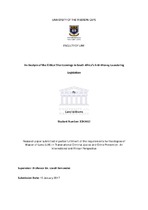| dc.description.abstract | From failing to arrest and surrender Sudanese President Omar Al-Bashir1 in accordance with its obligations under the Rome Statute of the International Criminal Court2 (Rome Statute), to its President acting inconsistently with its Supreme law3, it is evident that the rule of law is under threat in South Africa. Furthermore, South Africa has witnessed the cultivation of a culture of impunity for corruption in high office. South Africa has also experienced an increase in heinous crimes committed against women and children. The South African Rand recently plummeted given that its Minister of Finance Pravin Gordhan, recently faced charges of fraud4, as well as the ripple effect caused by the Fees Must Fall Movement.5 Against the backdrop of the above-mentioned issues that plague South Africa and hinder its development, the fight against money laundering hardly seems of pivotal importance in achieving the desired stability and development of the country. There is a public perception that money laundering is a crime of little consequence.8 This perception derives from the fact that money laundering does not have a direct impact on its victims and in some instances benefits the economy as it increases the profits for the financial sector and results in a greater availability of credit.9 Laundered money arguably is not harmful but rather beneficial to developing economies because money remains money, whether it is proceeds of crime or honestly earned.10 Although an increase in money is appealing to developing countries, the benefits that accompany laundered money are short-lived as the crime affects society adversely in the long run.11 However, where a country fails to prevent and prosecute money laundering offences, the prevalence of money laundering will impede the development of a state as it not only increases the profitability of crime and encourages the prevalence of corruption, but it also causes damage to critical financial sector institutions.12 Money laundering influences the commission of crimes that generate large amounts of profit, namely, organised crime, which is often described as the twin brother of money laundering.13 This is because criminals do not commit crimes to make money only but to enjoy this money as well.14 However, criminals need to launder their money in order to enjoy the proceeds of their criminal activities without drawing attention to these activities.15 Countries that combat money laundering effectively make it more difficult for criminals to launder the proceeds of their crimes. It becomes more risky for them to indulge in their ill-gotten gains, thus dissuading them from engaging in economic criminality.16 Money laundering is a process where the proceeds of crime are concealed and disguised in order to make them appear lawful.17 Criminals are thus able to enjoy the financial benefits of the crimes they commit.18 The pervasiveness of money laundering in a country does not only affect the confidence the public have in the country’s financial institutions but also undermines the confidence foreign investors and financial institutions have in a developing state’s financial institutions.19 A country can, therefore, run the risk of not benefitting from foreign direct investment.20 The financial institutions rely heavily on what the public think about their integrity.21 | en_US |

